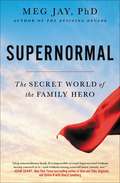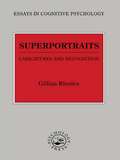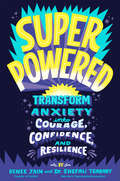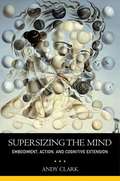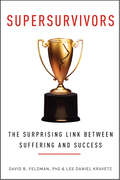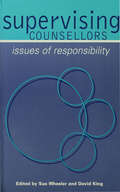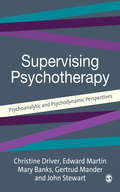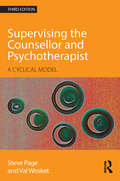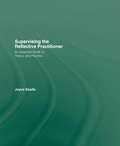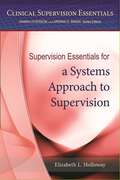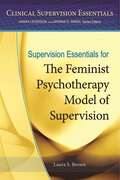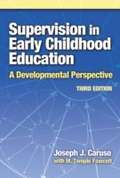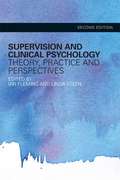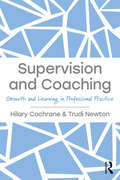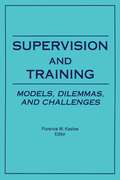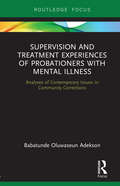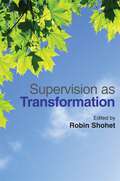- Table View
- List View
Supernormal: The Untold Story of Adversity and Resilience
by Meg Jayp.p1 {margin: 0.0px 0.0px 0.0px 0.0px; font: 12.0px Arial; color: #232323} Clinical psychologist and author of The Defining Decade, Meg Jay takes us into the world of the supernormal: those who soar to unexpected heights after childhood adversity.Whether it is the loss of a parent to death or divorce; bullying; alcoholism or drug abuse in the home; mental illness in a parent or a sibling; neglect; emotional, physical or sexual abuse; having a parent in jail; or growing up alongside domestic violence, nearly 75% of us experience adversity by the age of 20. But these experiences are often kept secret, as are our courageous battles to overcome them.Drawing on nearly two decades of work with clients and students, Jay tells the tale of ordinary people made extraordinary by these all-too-common experiences, everyday superheroes who have made a life out of dodging bullets and leaping over obstacles, even as they hide in plain sight as doctors, artists, entrepreneurs, lawyers, parents, activists, teachers, students and readers. She gives a voice to the supernormals among us as they reveal not only "How do they do it?" but also "How does it feel?"These powerful stories, and those of public figures from Andre Agassi to Jay Z, will show supernormals they are not alone but are, in fact, in good company.Marvelously researched and compassionately written, this exceptional book narrates the continuing saga that is resilience as it challenges us to consider whether -- and how -- the good wins out in the end.
Superorganism: Toward a New Social Contract for Our Endangered Species (Elements in Applied Evolutionary Science)
by Peter A. CorningAs evidence of our global survival crisis continues to mount, the expression 'too little, too late' comes to mind. We all live in an interdependent world which has an increasingly shared fate. We are participants in an emerging global 'superorganism' that is dependent on close cooperation. Indeed, positive synergy (cooperative effects) has been the key to our evolutionary success as a species. However, our ultimate fate is now in jeopardy. Going forward, we must either create a more effective global society (with collective self-governance) or our species will very likely be convulsed by mass starvation, waves of desperate migrants, and lethal social conflict. The greatest threat we may face is each other, and a regression into tribalism and violent conflict. This Element has a more hopeful prescription for a new global social contract. It is based on the many examples of superorganisms – socially organized species – in the natural world, and in evolution.
Superparenting!: Boost Your Therapeutic Parenting Through Ten Transformative Steps
by Amber ElliottTried nagging, shouting, taking away screen time, but with no success?Dr Amber Elliott explains why children who have experienced early trauma need something different - therapeutic parenting - a kind of everyday 'superparenting' which champions empathy over punishment.Trying to parent children who have trauma-triggered behaviours is tough, and none of us are perfect. Taking this as a starting point, Dr Elliott provides you with a ten-step process to transform your parenting. From developing self-acceptance and ideas for building motivation through to creative ways to think about structure and routine, the book combines principles with practical advice and exercises you can try out at home.Working together, you and your child can discover the secrets of superparenting and overcome trauma-triggered behaviours!
Superportraits: Caricatures and Recognition (Essays in Cognitive Psychology)
by Gillian RhodesAs Nixon's unpopularity increased during Watergate, his nose and jowls grew to impossible proportions in published caricatures. Yet the caricatures remained instantly recognizable. Caricatures can even be superportraits, with the paradoxical quality of being more like the face than the face itself.How can we recognize such distorted images? Do caricatures derive their power from some special property of a face recognition system or from some more general property of recognition systems? What kind of mental representations and recognition processes make caricatures so effective? What can the power of caricatures tell us about recognition?In seeking to answer these questions, the author assembles clues from a variety of sources: the invention and development of caricatures by artists, the exploitation of extreme signals in animal communication systems, and studies of how humans, other animals and connectionist recognition systems respond to caricatures.Several conclusions emerge. The power of caricatures is ubiquitous. Caricatures can be superportraits for humans, other animals and computer recognition systems. They are effective for a variety of stimuli, not just faces. They are effective whether objects are mentally represented as deviations from a norm or average member of the class, or as absolute feature values on a set of dimensions. Exaggeration of crucial norm-deviation features, distinctiveness, and resemblance to caricatured memory traces are all potential sources of the power of caricature.Superportraits will be of interest to students of cognitive psychology, perception, the visual arts and animal behavior.
Superpowered: Transform Anxiety into Courage, Confidence, and Resilience
by Dr Shefali Tsabary Renee JainThe perfect tool for children facing new social and emotional challenges in an increasingly disconnected world! This how-to book from two psychology experts--packed with fun graphics and quizzes--will help kids transform stress, worry, and anxiety. Give it to fans of The Confidence Code for Girls and Raina Telgemeier's Guts. <P><P>Now more than ever, kids need to feel empowered as they work through anxiety, overwhelm, and uncertainty brought on by the world around them. With its helpful, hands-on suggestions and tips, SUPERPOWERED will be embraced by every kid with insecurities, worries, and anxious thoughts. <P><P>Renee Jain (founder of GoZen!) and Dr. Shefali Tsabary (New York Times bestelling author and Oprah contributor) make readers the superheroes of their own stories. They introduce a toolkit of easy-to-understand methods for recognizing anxious behaviors, identifying the root causes of worried thinking, and realizing that strength can be found in reclaiming one's inner superpowers. <P><P>With the help of humorous artwork and interactive elements, readers find their P.O.W.E.R. (an acronym that inspires mindfulness and resilience practices) and gain lasting mental strength. <P><P><b>A New York Times Bestseller</b>
Supersizing the Mind: Embodiment Action and Cognitive Extension
by Andy ClarkWhen historian Charles Weiner found pages of Nobel Prize-winning physicist Richard Feynman's notes, he saw it as a "record" of Feynman's work. Feynman himself, however, insisted that the notes were not a record but the work itself. In Supersizing the Mind , Andy Clark argues that our thinking doesn't happen only in our heads but that "certain forms of human cognizing include inextricable tangles of feedback, feed-forward and feed-around loops: loops that promiscuously criss-cross the boundaries of brain, body and world." The pen and paper of Feynman's thought are just such feedback loops, physical machinery that shape the flow of thought and enlarge the boundaries of mind. Drawing upon recent work in psychology, linguistics, neuroscience, artificial intelligence, robotics, human-computer systems, and beyond, Supersizing the Mind offers both a tour of the emerging cognitive landscape and a sustained argument in favor of a conception of mind that is extended rather than "brain-bound." The importance of this new perspective is profound. If our minds themselves can include aspects of our social and physical environments, then the kinds of social and physical environments we create can reconfigure our minds and our capacity for thought and reason.
Superstition as Ideology in Iranian Politics
by Ali RahnemaA superstitious reading of the world based on religion may be harmless at a private level, yet employed as a political tool it can have more sinister implications. As this fascinating book by Ali Rahnema, a distinguished Iranian intellectual, relates, superstition and mystical beliefs have endured and influenced ideology and political strategy in Iran from the founding of the Safavid dynasty in the sixteenth century to the present day. As Rahnema demonstrates through a close reading of the Persian sources and with examples from contemporary Iranian politics, it is this supposed connectedness to the hidden world that has allowed leaders such as Muhammad Reza Shah Pahlavi and Mahmud Ahmadinejad to present themselves and their entourage as representatives of the divine, and their rivals as the embodiment of evil.
Supersurvivors: The Surprising Link Between Suffering and Success
by David B. Feldman Lee Daniel KravetzStarting where resiliency studies leave off, two psychologists explore the science of remarkable accomplishment in the wake of trauma, revealing the surprising principles that allow people to transform their lives and achieve extraordinary things.Over four billion people worldwide will survive a trauma during their lives. Some will experience severe post-traumatic stress. Most will eventually recover and return to life as normal. But sometimes, survivors do more than bounce back. Sometimes they bounce forward.These are the Supersurvivors—individuals who not only rebuild their lives, but also thrive and grow in ways never previously imagined. Beginning where resilience ends, David B. Feldman and Lee Daniel Kravetz look beyond the tenets of traditional psychology for a deeper understanding of the strength of the human spirit. What they have found flies in the face of conventional wisdom—that positive thinking may hinder more than help; that perceived support can be just as good as the real thing; and that realistic expectations may be a key to great success.They introduce the humble but powerful notion of grounded hope as the foundation for overcoming trauma. The authors interviewed dozens of men and women whose stories serve as the counterpoint to the latest scientific research. Feldman and Kravetz then brilliantly weave these extraordinary narratives with new science, creating an emotionally compelling and thought-provoking look at what is possible in the face of human tragedy. Supersurvivors will reset our thinking about how we deal with challenges, no matter how big or small.
Supervisie als proces: Een gids voor de praktijk
by Peter Daansen Greet Vanaerschot Nelleke NicolaiDit handboek biedt kaders én concrete handvatten voor de supervisor (in spe). De nadruk ligt op het leren faciliteren van het supervisieproces. Het laat zien hoe je als supervisor supervisanten kunt helpen psychotherapeutische en professionele vaardigheden te verwerven en integreren, zoals het opbouwen van een werkrelatie, het gepast en gefaseerd spiegelen en interveniëren, het toepassen van een behandelprotocol afgestemd op de cliënt, en het reflecteren op het eigen professioneel handelen. Supervisie als proces bestaat uit twee delen. Het eerste deel biedt een algemene oriëntatie op het werkveld van supervisie. Begripsbepaling en positionering van supervisie, rollen, taken, verantwoordelijkheden en competenties van de supervisor, alsook het supervisieproces komen aan de orde . Deel twee focust op de praktijk van supervisie in de verschillende fasen van het supervisieproces. Hoe zet je als supervisor de supervisant aan het werk? Hoe begeleid je de supervisant door zijn leercyclus? Welke tools kan je hierbij inzetten? Wat doe je als een supervisieproces vastloopt? Hoe vergroot je supervisants bewustzijn van onbewuste interferende processen en vormen van automatische coping? Wat zijn de aandachtspunten voor specifieke behandelcontexten? Dit boek is bestemd voor supervisoren en zij die daartoe in opleiding zijn. Het boek kan onder andere gebruikt worden binnen de opleidingen tot psychotherapeut, gz-psycholoog, klinisch psycholoog, klinisch neuropsycholoog, klinisch orthopedagoog en psychiater.
Supervising Counsellors: Issues of Responsibility
by David King Sue WheelerSupervising Counsellors is a practical and insightful guide to the responsibilities facing all those involved in supervising practitioners and trainees. Drawing together contributions and new research from those at the forefront of supervisory practice, this book makes essential reading for both qualified and trainee supervisors. Part One defines the supervisor′s clinical, legal and ethical responsibilities, and clearly sets out the law and professional codes relating to supervision. Part Two examines issues that arise for supervisors working in different contexts: organizations; training; primary care; and some of the wider issues concerning supervision, and highlights in particular the expectations of supervisees and the role of supervisors in ensuring that clients are not discriminated against.
Supervising Psychotherapy: Psychoanalytic and Psychodynamic Perspectives
by John Stewart Dr Gertrud Mander Mr Edward Martin Mrs Christine Driver Mrs Mary Banks`I enjoyed and was challenged by reading this book, and learned from, and with, it. It is useful for browsing and for a deeper exploration of chosen topics. It offers a healthy enrichment for all who have a dynamic interest in the external and internal supervisory relationship. I warmly recommend it' - British Journal of Psychotherapy `This book is thoughtful, scholarly and very well written. The content is well set out in separate sections making it eminently readable. It is solidly based on psychoanalytic theory highlighting the transformational impact of a supervisory process that is embedded in the dyadic relationships formed by the supervised patient - supervisee and the supervisee - supervisor. This book has greatly enriched my understanding of the supervisory process and the organizational life in which it transpires. It will be a richly informative resource for all involved in supervisory work' - Gemma Corbett, Self & Society Based on the view that supervision is in itself both a developmental and a therapeutic process, Supervising Psychotherapy examines the fundamental knowledge needed to become a skilled and effective supervisor. Written by a highly experienced team of trainers and supervisors, the book explores the triangular relationship which exists between supervisor, therapist and the absent patient or client. It describes in depth the complex dynamics which characterise this relationship, while avoiding the pitfalls of unconsciously colluding with or controlling the supervisee. In supervising the practice of others, supervisors must draw not only on their experience as a therapist, but also on a firm understanding of how people learn and of how organisational factors can impinge on therapy and supervision. The book examines the interface between supervision and teaching and between supervision and organisation and offers guidance in relation to: · unconscious processes in supervision · the supervisory triangle · supervising groups · supervising short term therapy · ethical practice · timing and ending of supervision. For those who are in the process of becoming supervisors and for those who already practising, Supervision in Psychotherapy is an enlightening and thought-provoking read. Mary Banks, Christine Driver, Gertrud Mander, Edward Martin and John Stewart are all trained supervisors who have been or are currently involved in training others in supervision. All are members of the British Association for Psychoanalytic and Psychodynamic Supervision (BAPPS).
Supervising Student Independence: A Research-based Approach to Academic Supervision in Practice
by Maria Zackariasson Jenny MagnussonThis open access book examines the supervision of undergraduate degree projects, with a particular focus on how supervision may contribute to developing student independence and academic literacies. Based on an extensive research project, it uses examples from focus group interviews as well as actual supervision situations, taken from different higher education programmes at several universities in Sweden and Russia. The authors discuss issues such as supervisors’ perceptions and understandings of student independence, the relationship between supervisor and student, the significance of emotions in the supervision process, different supervision tools to foster independence, and the supervisor’s role not only as a guide and helper but also as an assessor of the students’ work. The book will appeal to scholars within the field of teaching and learning in higher education, as well as those from other disciplines who are interested in developing their own supervision practice.
Supervising and Being Supervised: A Practice in Search of a Theory
by Jan Wiener Richard Mizen Jenny DuckhamSupervision is an essential constituent of analytic and psychotherapy training and a crucial part of ongoing professional development for all practitioners. In spite of this, little formal theory about supervision has been developed and, for the most part, learning to supervise has progressed using a simple apprenticeship model. Supervising and Being Supervised aims to rectify this situation. Jan Wiener, Richard Mizen and Jenny Duckham draw together contributions from a number of experienced Jungian analysts who supervise to explore key aspects of the supervisory experience with the aim of developing a theory for analytically-based work. Part One explores the nature of the supervisor-supervisee relationship, Part Two looks at a number of the settings and applications of supervision and Part Three examines problems that might occur in supervision. In the fourth and final part, and drawing on the previous chapters, the focus turns specifically to the challenges of developing a clear theory of supervision.
Supervising the Counsellor and Psychotherapist: A cyclical model
by Val Wosket Steve PageSupervising the Counsellor and Psychotherapist considers how to meet the supervision needs of trainee and experienced counsellors, psychotherapists and other helping professionals using an integrative approach that will appeal to practitioners from a broad range of backgrounds and theoretical persuasions. The book charts the development of the supervisor as he or she moves through making the transition from therapist to supervising the work of others and includes consideration of the advanced competencies required to supervise experienced practitioners. This third edition brings a number of contemporary perspectives to a well-known and widely respected core text for the training and development of supervisors. The Cyclical Model at the heart of the book has established its relevance in the UK as one of the best known frameworks for teaching and learning the steps and stages of supervision. All chapters in this new edition have been extensively revised and updated, and key elements include: - Two brand new chapters on deepening supervision practice and moving beyond supervising counsellors and psychotherapists - Updates on recent developments in supervision, including research outcomes, the use of technology and supervising short-term work - Creativity, play and the use of metaphor and imagery in supervision - Developing the use of self through relational supervision. Supervising the Counsellor and Psychotherapist is a key text for trainee and experienced supervisors of counsellors and psychotherapists, those who train supervisors, and supervisees wishing to better understand the supervisory process.
Supervising the Reflective Practitioner: An Essential Guide to Theory and Practice
by Joyce ScaifeDevelopment as a reflective practitioner has become an essential quality for practitioners in the fields of health, education and social care. Supervising the Reflective Practitioner provides guidance for supervisors, focusing on what they can do to facilitate the development of reflective practice in supervisees. This book contains a wide range of practical examples including personal accounts and illustrations. Topics covered include: what is reflective practice and why is it important now? how reflective practice connects with personal and professional development key issues in supervising reflective practice methods that can be used in supervision. This accessible book will be of great interest to both supervisors and supervisees who practice clinically in a range of professions, including applied psychology, counselling, psychotherapy, psychiatry and nursing. It will also be useful for professionals working in education, health, and social care who want to support supervisees in the development of reflective practice.
Supervision Essentials for a Systems Approach to Supervision (Clinical Supervision Essentials Series)
by Elizabeth L. HollowayA systems approach to supervision conceptualizes the supervisory relationship as consisting of several key dimensions, or systems, which interact in subtle ways across various contexts. These systems include the client, the trainee, the supervisor, the functions and learning tasks in supervision, and the professional institution in which the supervision process is taking place. This book demonstrates the various roles supervisors play, from monitor and advisor, to role model, consultant, and mentor, and offers clear, compelling demonstrations of competencies including counseling skills, case conceptualization, ethical practice, intra and interpersonal awareness, and self-evaluation.
Supervision Essentials for the Feminist Psychotherapy Model of Supervision (Clinical Supervision Essentials Series)
by Laura S. BrownWhile feminist therapy has grown in stature and recognition in the last few decades, comparatively little has been written about supervision and consultation from a feminist standpoint. In this book, the latest in the Clinical Supervision Essentials series from APA Books, Dr. Laura Brown remedies this deficit by presenting a theoretically-grounded, yet practical approach to supervision based on the principles of feminist psychotherapy. This volume offers a framework for translating feminist therapy constructs — including recognizing the impact of systemic hierarchies, and thinking critically about dominant cultural norms in the practice of psychotherapy — into the supervision setting. Incorporating practices derived from multicultural, queer, and other critical psychologies, feminist therapy supervision challenges trainees and supervisors alike to engage with difficult questions about the presence of bias, and ways in which power distributes itself in the context of education, psychotherapy, and supervision itself. Includes a synthesis of the literature on feminist therapy and theory, as well as case examples and practical advice for resolving common supervision problems. The book also offers close analyses of the author's consulting session documented in the DVD Feminist Therapy Supervision, also available from APA books.
Supervision In Early Childhood Education: A Developmental Perspective
by Joseph J. Caruso M. Temple FawcettEvery early care and education program deserves a qualified and competent supervisor. This pioneering text continues to address the special needs of administrators and staff to help them expand and improve their supervisory skills. The first to provide guidelines and practical suggestions for staff training and development in early childhood settings, this classic volume is still the best choice for those supervising staff from a wide variety of educational and cultural backgrounds.
Supervision and Clinical Psychology: Theory, Practice and Perspectives
by Ian Fleming Linda SteenIncreased attention is now being paid to the role of supervision in both pre-qualification and post-qualification practice in clinical psychology in the UK. This definitive text addresses the issues of central concern to supervisors in clinical psychology. Senior trainers and clinicians draw on relevant research and their own experience, covering:* historical development of supervision and a review of worldwide literature on supervision* supervisory and therapy models* maximizing supervisory resources* supervisory training and effectiveness* cultural and gender issues in supervision* measuring the effectiveness of supervision* future perspectives for supervision in clinical psychology. Supervision and Clinical Psychology provides practical advice essential for clinical psychology supervisors, as well as those in psychiatry, social work and psychotherapy.
Supervision and Clinical Psychology: Theory, Practice and Perspectives
by Ian Fleming and Linda SteenWhat are the developments influencing supervision in clinical psychology? Supervision is crucial to good professional practice and an essential part of training and continuing professional development. This second edition of Supervision and Clinical Psychology has been fully updated to include the recent developments in research, policy and the practice of supervision. With contributions from senior trainers and clinicians who draw on both relevant research and their own experience, this book is rooted in current best practice and provides a clear exposition of the main issues important to supervision. New areas of discussion include: the impact of the recent NHS policy developments in supervisor training practical aspects of supervision a consideration of future trends. Supervision and Clinical Psychology, Second Edition is essential reading for clinical psychology supervisors as well as being invaluable to those who work in psychiatry, psychotherapy and social work.
Supervision and Coaching: Growth and Learning in Professional Practice
by Trudi Newton Hilary CochraneWhat is supervision, and what is distinctive about supervision for coaches? This book has a dual purpose: to explore the value of supervision to both giver and receiver in a transformative relationship, and to offer practical guidance for both beginning and experienced supervisors. In Supervision and Coaching, Hilary Cochrane and Trudi Newton create a story of supervision, beginning with a challenge: how can we find an understanding of what happens in supervision, and what is it that we do that enables learning in this relationship to be both a source of professional growth and personal development? The authors identify what goes on in the process of supervision, whatever the field of application, and look at the role of being a supervisor as separate and different from being a master practitioner or mentor. With clarity and through real-life examples, the book explores the relationship and the developmental impact of supervision, using transactional analysis and other models to understand and discuss its psychological basis. Supervision and Coaching includes current theories of adult learning and sections on creating effective contracts, supervision with groups and working as an external supervisor for internal coaches. Combining practical guidance for both beginning and more experienced supervisors with reflection on the underpinning 'roots' of supervision, Supervision and Coaching will be an essential resource for coaches in practice and in training, coach supervisors and other people-work professionals working in a supervisory role.
Supervision and Training: Models, Dilemmas, and Challenges
by Florence KaslowChallenging methods of training, consultation, and supervision--predicated on different ideas about how people learn most effectively--are highlighted in this exceptional volume. Distinguished educator Florence W. Kaslow has compiled new concepts and state-of-the-art approaches that greatly enhance our understanding of the process whereby good professionals become better professionals. Both direct and indirect training methodologies are discussed, and a variety of dynamic, behavioral, and eclectic approaches to the supervision of individual, group, and family therapies are described.
Supervision and Treatment Experiences of Probationers with Mental Illness: Analyses of Contemporary Issues in Community Corrections (Advances in Mental Health Research)
by Babatunde AdeksonEmerging from a qualitative research study on the rehabilitation experiences of adult male probationers with mental health illness, this book describes the treatment and rehabilitation experiences of these individuals and contextualizes their experiences within the landscape of mental health treatment in the United States. Often underserved in outpatient community support programs, probationers with mental health illness (PMIs) face stigma and obstacles in seeking mental health treatment and rehabilitation. Examining the lived experiences of both PMIs and their probation officers, this book offers insights into the study of stigma as it relates to probationers and the work of probation officers in furthering treatment and rehabilitation options for PMIs.
Supervision and its Vicissitudes (The EFPP Monograph Series)
by Brian MartindaleThis book is primarily concerned with the application of psychoanalytic ideas to work in the public sector. It largely deals with the type of supervision work with individuals, teams, and institutions that will often be in demand and useful in the public sector.
Supervision as Transformation: A Passion for Learning
by Michael Carroll Richard Olivier Mary Creaner Ann Rowe Fiona Adamson Robin Shohet Joan Wilmot Judy Ryde Ben Fuchs Christina Breene Nicola CoombeSupervision provides a positive space for compassion, inquiry, reflection, and above all development. The chapters in this book are written from a wide range of perspectives, all of which take a practical approach to supervision and show how transformative it can be when approached in the right way. Contributions range from explorations of supervision as a journey of life-long learning and its place at the heart of practice to chapters on faith, transformation, dealing with feelings, and working with asylum seekers and refugees. The multidisciplinary approach covers much ground not previously touched upon, and every contribution demonstrates just how powerful and transformational passionate supervision has the potential to be. This book will be an invaluable resource for anyone working in the helping professions, for whom supervision is an integral part of their work.
